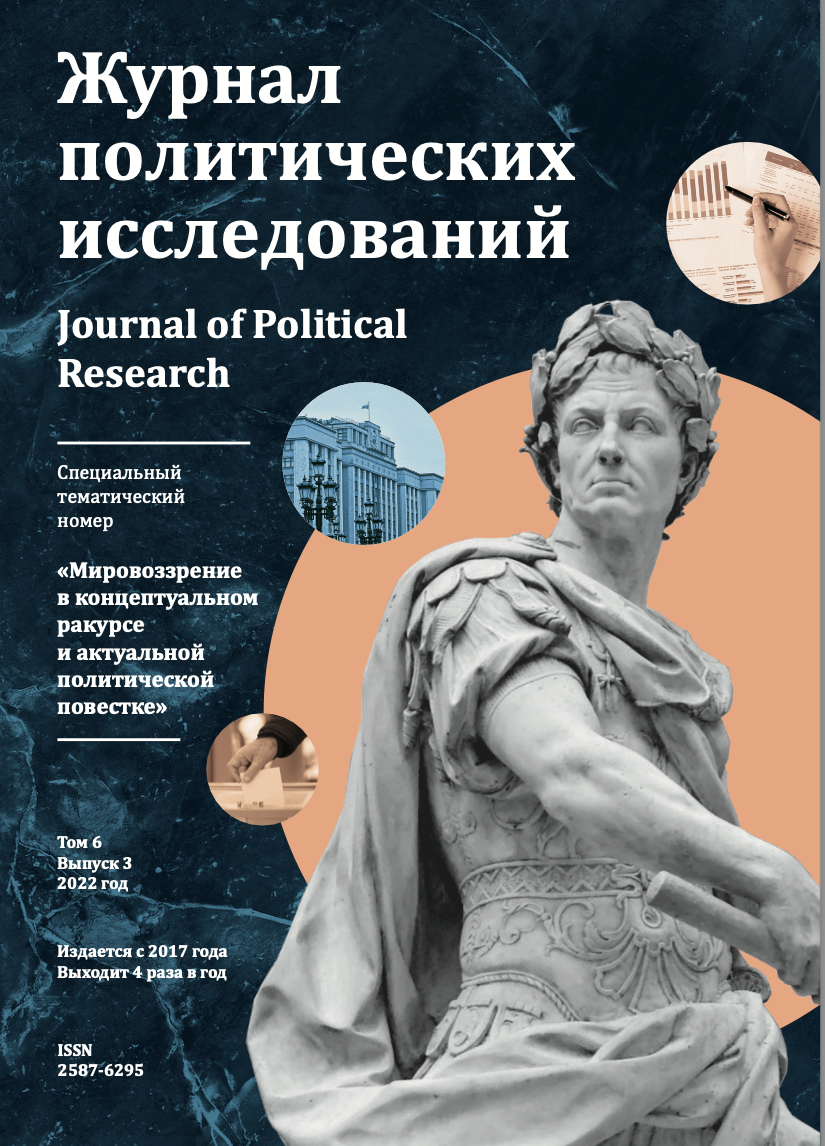Russian Federation
UDC 32.019.5
The purpose of the article is to clarify the methodology of studying stereotypes inherent in the dialect of memory of the Russian generation Z, as well as to determine strategies for their (de-)construction in the oppositional liberal discourse. The main methodological guideline for the author is the neoinstitutional approach to stereotypes, which is concretized based on secondary data from sociological and linguistic studies. As a result, the author comes to the conclusion that, firstly, stereotypes play a key role in constructing the image of historical epochs among the youngest generation of Russians; secondly, the Stalinist and Yeltsin epochs are the most important for the dialect of memory of generation Z; thirdly, an acute ideological struggle is being waged within Russian society for the interpretation of these epochs; finally, the construction or deconstruction of stereotypes as elements of the dialect of memory of generation Z plays a crucial role in this struggle. Analyzing in more detail the relevant strategies of the Russian liberal opposition, the author emphasizes its desire, on the one hand, to weaken the "pro-Stalinist" (pro - Soviet) stereotypes in the minds of young people and, on the contrary, to strengthen the "pro-Yeltsin" ones, constructing an image of the "glorious (but not "dashing") nineties". The article notes that an important role in this work with the stereotypes is played by the aesthetic experience of young people as a space for legitimizing power at the level of theoretical statements in a rudimentary form
stereotype, discursive institution, generation Z, dialect of historical memory, historical generations, liberal opposition
1. Berger P., Lukman T. Sotsial'noe konstruirovanie real'nosti. (Traktat po sotsiologii znaniya). [The Social Construction of Reality. A Treatise on sociology of Knowledge]. Moscow, «Asayeggna-Center», «Medium», 1995, 323 p. (In Russian).
2. Bonch-Osmolovskaya A. A. Imena vremeni: epitety desyatiletiy v Natsional'nom korpuse russkogo yazyka kak proektsiya kul'turnoy pamyati [Names of time: Epithets of decades in the Russian National Corpus as a projection of cultural memory]. Shagi [Steps], 2018, no. 4, pp. 115-146. DOI:https://doi.org/10.22394/2412-9410-2018-4-3-115-146 (In Russian).
3. Konstantinov M. S. et al. Kognitivno-ideologicheskie matritsy vospriyatiya studentami Yuga Rossii sovremennykh sotsial'no-politicheskikh krizisov: monografiya [Cognitive-ideological matrices of students' perception of modern socio-political crises in the South of Russia: monograph]. Rostov-na-Donu; Taganrog, Izdatel'stvo Yuzhnogo federal'nogo universiteta, 2021, 282 p. (In Russian).
4. Lippman U. Obshchestvennoe mnenie [Public Opinion]. Moscow, Institut Fonda «Obshchestvennoe Mnenie», 2004, 384 p. (In Russian).
5. Lotman Yu. M. Pamyat' v kul'turologicheskom osveshchenii [Memory in cultural illumination]. Lotman Yu.M. Izbrannye stat'I [Lotman Yu. M. Selected articles], vol. 1, Tallinn, 1992, pp. 200-202. (In Russian).
6. Malinova O. Yu. Konstruirovanie smyslovykh ramok pamyati o reformakh 1990-kh gg. v liberal'nom diskurse 2000-kh gg. [Framing Memory about the Reforms of the 1990s in the Liberal Discourse in the 2000s.]. Yuzhno-rossiyskiy zhurnal sotsial'nykh nauk [South-Russian Journal of Social Sciences], 2019, vol. 20, no. 3, pp. 91-105. DOI:https://doi.org/10.31429/26190567-20-3-91-105. (In Russian).
7. Malysheva E. G. Lingvokognitivnyy analiz diskursa: ponyatiyno-terminologicheskiy apparat issledovaniya [Discourse analysis: linguistic and cognitive concepts and terminology unit studies] Stylistyka XXIII. Dyskurs i styl - Discourse and Style, 2014, pp. 319-327. (In Russian).
8. Piters B. G. Politicheskie instituty: vchera i segodnya [Political institutions: yesterday and today]. Politicheskaya nauka: novye napravleniya / pod red. R. Gudina i Kh.-D. Klingemanna [A New Handbook of Political Science / ed. by R. Goodin and H.-D. Klingemann]. Moscow, Veche, 1999, pp. 218-232. (In Russian).
9. Radaev V. Millenialy: Kak menyaetsya rossiyskoe obshchestvo [Millennials: How Russian society is changing]. Moscow: Izd. dom Vysshey shkoly ekonomiki, 2019, 224 p. (In Russian).
10. Saakyan A. K. Sotsiologicheskoe issledovanie sotsial'nykh stereotipov kak povedencheskogo regulyatora molodezhi [A sociological study of social stereotypes as a behavioral regulator of youth]. Problemy sotsial'no-ekonomicheskogo razvitiya: poiski, perspektivy, resheniya. Sb. statey. [Problems of socio-economic development: searches, prospects, solutions. Collection of articles], no.1 (2). Erevan: EF REU im. G.V. Plekhanova, 2019, pp. 318-328. (In Russian).
11. Sibirev V. A., Golovin N. A. Mezhpokolencheskie razlichiya v udovletvorennosti zhizn'yu i chuvstve schast'ya v Rossii (na materialakh Evropeyskogo sotsial'nogo issledovaniya) [Intergenerational differences in life satisfaction and happiness in Russia (based on the materials of the European Social Research)]. Monitoring obshchestvennogo mneniya: Ekonomicheskie i sotsial'nye peremeny [Public opinion monitoring: Economic and social changes], 2020, no. 1, pp. 296-315. (In Russian).
12. Yakukhnova E. G. Meditsinskie stereotipy i ikh formy vyrazheniya v kul'ture [Medical stereotypes and their forms of expression in culture]. Kul'tura i tsivilizatsiya [Culture and civilization], 2018, vol. 8, no 1A, pp. 278-285. (In Russian).
13. Schmidt V. A. Discursive institutionalism: The explanatory power of ideas and discourse, Annual Review of Political Science, 2008, vol. 11, pp. 303-326.




















